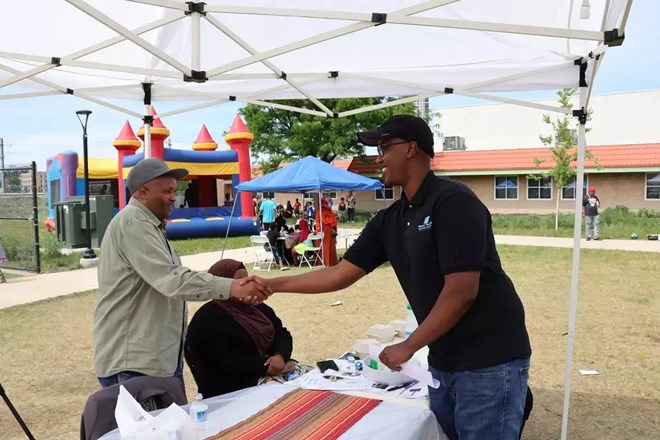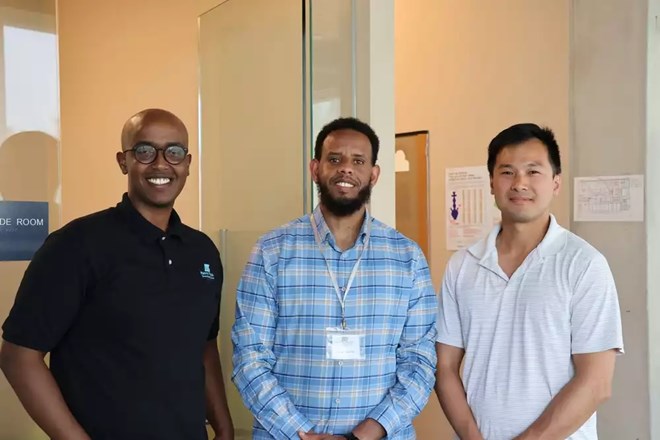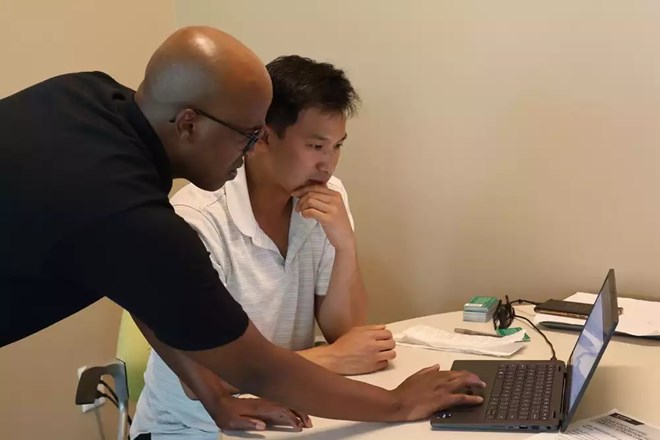
Friday June 9, 2023
By Michelle Wiley

U of M assistant professor Abdifatah Ali talks to people at a community health and wellness fair in Minneapolis. He, along with assistant professor, Ivan Wu, are working on a study about cancer.Michelle Wiley | MPR News
On a hot day in late May, Abdifatah Ali walks through a community health and wellness fair at Currie Park in the Cedar-Riverside area of Minneapolis. As kids run in the fountains and play in the bounce house, Ali, an assistant professor at the University of Minnesota, is searching for someone who might be willing to leave the festivities and go across the street to fill out a survey about cancer.
Cancer is one of the leading causes of death in Minnesota, and nationally. As with other aspects of health, there can be vast racial disparities in prevention and treatment. A Nov. 2022 report from the MN Community Measurement survey found that “[e]xcept for white patients, patients from all other race categories had significantly lower rates of colorectal cancer screening compared to the statewide rate.”
On top of that, people may not have insurance, transportation or be able to get time off for medical appointments. And then there’s the actual interaction with the physician, where there may be cultural and language barriers. People may also lack accurate information.
Colon cancer, like some other cancers, can have a higher survival rate when caught early. Which is why testing regularly, especially if you’re high-risk, is crucial. The U.S. Preventive Services Task Force recommends screenings for adults aged 45 to 75.
“One time I was having a conversation with an elderly Somali male about colonoscopy, and colon cancer. And, you know, there's a lot of stigma around getting [a] colonoscopy and health procedures done. Some people don't understand the extent of the procedure; if it's a full surgery, or if it's something that, you know, can be done while the individual is awake,” Ali said.
“So just having those talks and conversations, we've realized that there is a need for education and an opportunity to help our people understand.”
In an effort to address some of those disparities, Wu and Ali, along with their community partners, are embarking on a study to better understand what people in the East African community know about cancer, and develop better education to help prevent it.

From left to right: Abdifatah Ali, Rashad Ahmed and Ivan Wu are working on a study that could one day help educate people in the East African community about cancer.Michelle Wiley | MPR News
An ongoing conversation
The idea for the research came up organically. Wu and Ali have known each other for years, since they were students at Michigan State University. Both were peer mentors, assigned to the same session.
“I remember him asking certain questions, and I was asking certain questions, and we were like, ‘wow, we think alike. I need to know who this guy is.’” Wu said.
They bonded over their mutual interests. They were in the same department, and both from California.
“We just hit it off. And ever since then [we] talk about research, and we've collaborated over the years,” Ali said. So when they both ended up at the U of M, they continued their conversations.
The idea for this research came up over cups of tea.
“I was like: I'm personally not aware of any assessments or this type of research that's been done, when it comes to the East African Community,” Ali said. “Maybe there's an opportunity for us to look into some of these issues.”
Then there was a funding call at the Masonic Cancer Center. The two have $100,000 for a two-year study. Ali and Wu expect to have data collected and analyzed by early next year.
The aim of the project is to reduce cancer disparities by building knowledge in community health workers. They want to find the gaps, in terms of what services are being provided, and train trusted people in the community so they can provide the best interventions possible.
While Wu says that similar research exists for Latino communities, they don’t know if the same approach will work for the East African community. The preliminary survey has basic questions: Have you ever heard about cancer? How knowledgeable do you feel about preventing cancer? What are common signs and symptoms of cancer?
The researchers said it’s important to start from this baseline level.
“We can't come in with assumptions,” Ali said. “I think, oftentimes, we're coming from a place of knowledge as academics. And so when you have all that knowledge, you can maybe make some assumptions — some faulty assumptions — about where the community is.”

Abdifatah Ali and Ivan Wu troubleshoot the survey they are using to find out what people in the East African community know about cancer.Michelle Wiley | MPR News
A community-centered approach
Ali and Wu say it’s important to partner with community organizations from the beginning. The researchers are working with the Twin Cities nonprofit Metro Youth Diversion Center.
“We have a lot of community members that really are lacking the access to resources,” said Executive Director Rashad Ahmed. “So they're coming to us asking us for help. I know there's a language barrier, there's a cultural barrier. And that is where we fit in. We come in because we understand the languages and the cultures. And that makes it easy for them to trust us.”
Ahmed said if people don’t understand something, they won’t be able to trust it. “So we are here to provide that opportunity for community to connect with the providers, and then be the liaison between the health care system and the community.”
They also know the kinds of challenges that the community is facing. Whether that’s getting insurance, finding providers or learning more about cancer treatment and options.
“We are the ones that are connected to the community, we are the ones that see all the issues are coming up — all the complaints, all the situations that our people are facing,” he said. “So I think having [community organizations] at the table, and being part of the research project is very crucial. And I think that's the key to finding solutions to some of our pressing issues.”


